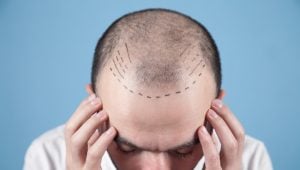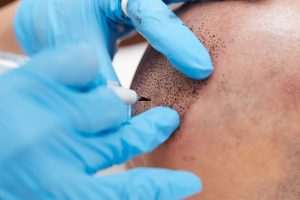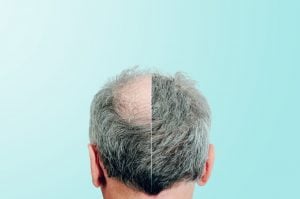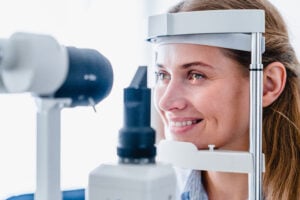Hair loss, that affects both males and females, can have devastating effects on one’s self-esteem and emotional wellbeing. This claim can be backed up with the fact that the hair restoration industry has reportedly surpassed the 3.5 billion USD mark in America alone!
…And we’ll let you in on a little secret…
Did you know that celebrities such as Johnny Depp, Jason Donovan and Wayne Rooney are all rumoured to have had hair transplants?
So, What Causes Hair Loss?
Hair loss can be caused by a number of factors including:
- Genetics
- Hormone imbalances
- Disease
- Stress
- Pregnancy
- Traction Alopecia
- The side-effects of medication
Males show a typical pattern of hair loss from the front of the forehead, whilst women mostly have hair-loss at the back of the scalp.
Current and Future Treatment Options
If you have changed your diet and have given a “hair-grow” shampoo a try without seeing any noticeable improvements – then you might want to consider one of the more drastic measures:
- Laser Light Therapy. This treatment can be applied at home using one of many available hand-held devices. While there is no certain proof that laser light therapy truly works wonders, the gist of it is that it helps to grow new hair by stimulating blood flow to the area.
- Hair Replacement Surgery. If you don’t mind going under the needle, then hair replacement surgery is one of the best solutions for replacing lost hair. With this procedure, doctors will discretely remove strips of your natural hair and then use it to fill in “gaps” on your head.
- FUE Hair Transplant, or follicular unit extraction, is a process similar to your regular hair replacement surgery, with one difference – no incisions are made. Instead, harvested grafts are inserted into your scalp with tiny punches (eliminating scarring).
- Propecia, often referred to as Finasteride, is an FDA-approved drug. It works its magic by blocking the production of a male hormone in the scalp referred to as androgen dihydrotestosterone. By shutting down this hormone, you stop follicles that cause male baldness in their tracks.
- Minoxidil is a topical treatment that encourages the sprouting of new hair. It also helps to stop the hair loss process. While this medication is FDA approved, it can have serious side effects. Once you stop the treatment, you will start to lose your hair once again – almost immediately.
Medical Tourism and the Hair Transplant Industry
Hair transplants can weigh heavy on your pocket and can currently cost anything from $3000 to $15000. This is why many desperate patients make an effort to visit other countries where the procedures are more affordable. For example, in South Africa and Turkey, a Surgical Hair Restoration can cost as little as $1500.
Turkey, in fact, has become quite the mecca for hair restoration treatments and hosts many professional hair transplant surgeons who boast excellent reputations. Beware, however, since there are also many chance takers and some services are not compliant.
Interested in a hair transplant?
How to Navigate the Turkish Hair Transplant Market
1. Don’t just jump in – do your research!
Turkey has struggled with political and economic instability in the last few years with the Turkish Lira dropping significantly in value, however, despite this, patients from the UK, Europe and the Middle East stream in for hair transplants. Treatment prices are low and so are the cost of flights.
2. Beware of competition
The hair transplant industry in Turkey is extremely competitive. In order to attract medical tourists, most clinics charge between $1500-$4000. These low figures create a gap for unqualified and inexperienced providers to provide a “solution” – so do your homework on the competing companies carefully.
Interesting statistics:
- Almost five hundred surgeons in Turkey are qualified hair surgeons
- Istanbul has more than 350 hair restoration clinics
- The industry worth is estimated at over 1 billion dollars
- About 60 000 medical tourists visit Turkey each year for a hair transplant
3. Accreditation, accreditation, accreditation!
This point cannot be stressed enough. If you travel to Turkey (or any other overseas destination for that matter), ensure that the facility where you will have your surgery is accredited by an internationally recognized body, such as the JCI. Check for current local licensing as well.
4. Don’t fall for beautiful marketing
Centres that have an excellent healthcare reputation will never stoop to advertising their services by using persuasive language and paid for client referrals. It’s difficult to choose from a crowded marketplace, but don’t fall prey to referral seekers. Your best bet is to ask for evidence of clinical outcomes and have direct conversations with the clinic.
5. Find fellows alike!
If you are new to this industry, we suggest you first identify your hair loss stage using the Norwood Scale and then find similar patients online on hair loss forums to see how they got on. You can also ask hair transplant clinics in Turkey to send you examples of similar Norwood scale case studies and patient testimonials.
6. Don’t pay for a prince but settle for a pauper!
Before committing to a surgical procedure, ensure that the quoted physician will perform the surgery. Sometimes surgeons pass the work onto their junior staff or assistants who have far less experience in the field.
7. Even the prince needs his credentials checked!
Don’t be fooled by a title. Your hair might be your crowning glory, so make sure that the person who operates is Board Certified and accredited to perform this surgery in his country.
At present, there is no board certification for this specialty in America. However, members of the ABHRS (American Board of Hair Restoration Surgery) have to write an exam to join. This examination is recognized by the AHLA (American Hair Loss Association) – a non-profit association for business owners.
The International Alliance of Hair Restoration Surgeons (IAHRS) screens surgeons selectively and its elite membership represents the best leaders in the field. Few surgeons in Turkey are listed as ISHRS doctors (International Society of Hair Restoration Surgeon).
8. Mirror, mirror, on the wall!
Photographic evidence of hair restorations in the form of before-and-after pictures is crucial for judging a surgeon’s style and skill. They should be readily willing to show examples of their work in stages, namely; pre-op, post-surgery, a few months after surgery and two to three years later. It would also be beneficial if patients were willing to supply testimonials.
Be wary of clinics posting stock photos. Make sure to do a Google search to look for duplicate use of photos.
9. Read online reviews with a pinch of salt
Social media marketing specialists are paid to sell services to customers online and many of them excel at fabricating reviews or paying for reviews. This is why we advise you not to believe everything you see online.
Do your own research, check for genuine patient testimonials and prepare questions for your first appointment. Good questions to ask are:
- Is the hospital or clinic accredited?
- Are you a board-certified plastic surgeon?
- How many hair transplant surgeries have you performed?
- What are the risks and complications?
- How will you approach my specific surgery and how many grafts will I require?
- Am I a good candidate?
- How long will I take to recover?
- What are my options if I am unhappy with the results?
- Can you show me similar case studies using the Norwood Scale?
The bottom line…
Research the clinic well and speak directly to them by video call. Trust your gut and if any of the answers or feedback worries you, there’s likely reason to be concerned.















